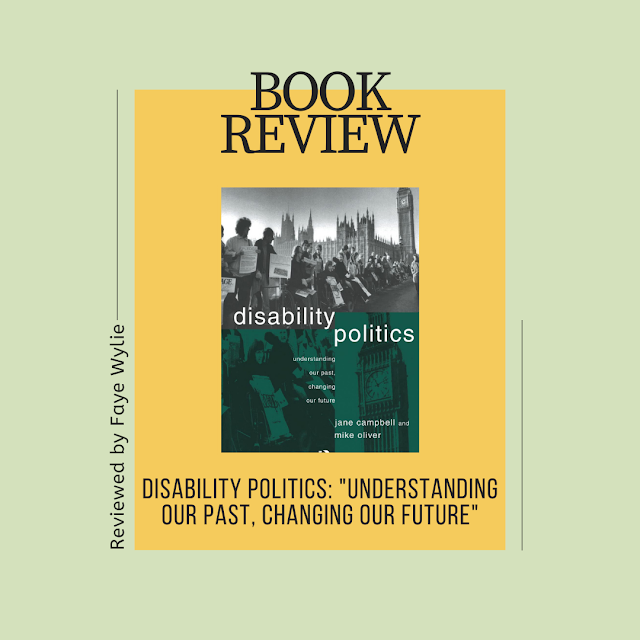Book Review of "Disability Politics: Understanding Our Past, Changing our Future" by Jane Campbell & Mike Oliver
Book Review of "Disability Politics: Understanding our Past, Changing our Future" by Jane
Campbell and Mike Oliver
What an incredible book!
Told from different people’s perspectives, who took
part in creating the Disability Discrimination Act 1995. This tells the story of
how it came to be. Beginning in the 1960s, where staff snobbery towards kids of
working class backgrounds in schools similar to boarding schools. How, if you
became disabled in adulthood, your choices were to manage alone or live in a
residential home/hospital ward. There were no carers, PAs or support workers to
assist you with an independent life.
One man spoke of inaccessible buildings and
how employment was (and still is) impossible, unless you work for less or free.
The man spoke of how he telephoned the benefits office from the village phone
box every week because he couldn't get in to the building. Only to be told there
was nothing available. The book talked about life before the blue badge,
disabled toilets and concessions - all things we take for granted today.
It also
talks about the difficulties faced by those wanting and needing change and not only
resistance from the able bodied, but the disabled community, who'd been
conditioned into believing what they had was fine. As the fight for disabled
people to have decisions about their own life, made by them, not an able bodied
person who had little experience, continued into the 1980s, fractions between
the different disabled organisations began to show.
The lessons that came out
of it were for change to happen, the disabled community need to stick together
and fight for equality.
The book also covered other minority groups that were treated with
inequality, such as people of colour and the LGBTQ+ communities, the
similarities faced through history and still today.
The participants acknowledge
that the 1980s and just before the disability discrimination act was passed in
1995 was when the disability issues were thrust into the non-disabled
consciousness, with lots of media coverage on television and radio, lobbying
politics, saying 'What about us?' until those in power listened.
These groups of
people were the pioneers of equality, helping the non-disabled see that we are
human too, we make valid contributions to society, we deserve recognition, access and the right to make our own choices.
I am incredibly appreciative to
these original pioneers of equality, who were disregarded and treated inhumanely. Yet they still fought on so that people like me and the future disabled would have
the human right to exist and be treated with a little more dignity than they
were.
So, how far have we come?
In the era post Disability Discrimination Act (1995) and Equality Act (2010), which subsequently replaced it, I can see how far
society has come, and the miles ahead to go.
Public Transport and Buildings:
Although, legally speaking, disabled people are allowed in places, many are
inaccessible - whether it's a taxi or large supermarket chain refusing a
blind/visually impaired person and their guide dog access, an established university expecting a wheelchair user to 'leave your chair at the bottom of
the stairs and walk'.
However,
the most inaccessible place I have found, is the theatre. The option for audio
description BSL/ autism friendly performances are limited to one, if that, date
per run. This is not the fault of the theatre, but the production companies who
choose not to be accessible.
The book also covers acquiring
equipment, housing and employment, but I don't feel I have enough experience of
this, other than to ask, why do businesses see disabled people as millionaires? Charging a fortune, when the non-disabled equivalent is half the price? Do they
know that disabled people are some of the poorest in society?
I implore
everybody, disabled or not, to read this book.
The likelihood is that we will all one
day become disabled, it may be age, illness, accident or something else,
or we may care for someone who is. It may be long-term or short-term. My point
is that disability will impact on all of our lives at some point.
It's humbling,
as a disabled woman, who lost her abilities post Disability Discrimination Act (1995),
to hear the struggles of the past and to also to see how far there is to go before
inclusivity becomes the norm.
Thank you for reading.
Please share so that others can be educated on the importance of equality for all.
You can purchase the book here.




Comments
Post a Comment